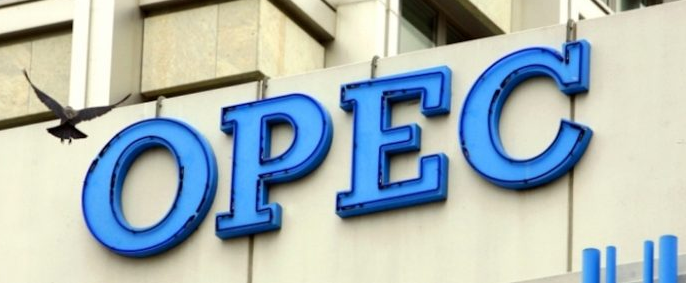OPEC Projects 11m bpd Oil Demand Shortfall By December

- Banks on COVID-19 vaccines for market recovery
- US company, Moderna, announces 95% efficient vaccine
By Emmanuel Addeh in Abuja and Martin Ifijeh in New Jersey, USA
The Organisation of Petroleum Exporting Countries (OPEC) has predicted that despite increasing stability in the demand for crude oil by China and India, there will be a reduction in the demand for the product by about 11 million barrels per day by the end of the year.
Speaking at the virtual 46th meeting of the Joint Technical Committee of the oil cartel, OPEC Secretary-General, Dr. Sanusi Barkindo, stated, however, that the market will likely rebound by six million bpd by 2021, if the expected vaccines for COVID-19 become effective.
Coincidentally, an American company, Moderna, yesterday announced that its vaccine had shown 95 per cent effectiveness against the virus.
During the conference, Barkindo told delegates that the OPEC supply cuts, which started in April, must be strictly adhered to in order to ensure the stability of the prices of crude oil and avoid a reversion to the devastating fall in prices in the first quarter of this year.
He added that the threat of the coronavirus was not over yet as countries have returned to lockdowns to curtail the impact of the pandemic.
He said:
The prospects for oil demand continue to remain weak. We expect demand this year to stay stagnant at about 90 mb/d, which represents a staggering decline of nearly 11 mb/d for the year compared to our January projection.
For the coming year, demand should bounce back, growing by at least 6 mb/d. However, this latest forecast reflects a downward revision of around 400,000 b/d.
I would add here that our overall projections are more or less in line with the International Energy Agency, whose latest market report alludes to the role of the DoC and its strong conformity levels in helping to stabilise the global market.
He said looking again at India and China, oil demand in these countries are expected to bounce back next year and grow by 14 per cent in India and nearly nine per cent in China compared to 2020.
That translates into combined growth of close to 1.7 mb/d for 2021,
Barkindo stated.
The OPEC boss noted that the pandemic had continued to impact on the global oil market, as the new wave of the disease, has created uncertainties in the market except efforts to find effective vaccines are ramped up.
Today, there is a sense of déjà vu. As was the case earlier this year, health systems are again struggling to cope with rising patient numbers and policymakers are wrestling to contain the virus without causing further economic disruption.
Here in Austria, as you might have heard, the government on Saturday announced stringent measures, the second lockdown this year, amid the resurgence of a stronger wave of COVID-19 that is straining the country’s health system,
he said.
He said at the OPEC Secretariat,
employees have again been instructed to work from home whenever possible to help ensure their good health and that of their families and colleagues.
On the economy, Barkindo stated that the OPEC foresees global GDP declining by more than four per cent this year, a stunning setback when compared to its January projection of +3.1 per cent for 2020.
Our projections reflect a cautious outlook for the coming year, with growth now expected at 4.4 per cent in 2021. The forecast for next year represents a healthy rebound but is nonetheless a downward revision from the 4.5 per cent we presented at last month’s meeting,
the OPEC boss stated.
Describing the times as exceptional, Barkindo cautioned that it was no time to lower the guard, urging members to remain vigilant and ready to respond to shifts in market conditions and to continue to work towards sustainable oil market stability.
Getting there means sticking to our shared commitment to achieve 100 per cent conformity, which is not only fair and equitable, but vital for the ongoing and timely rebalancing efforts,
he said.
Nigeria Seeks Review of OPEC’s Production Quota
Meanwhile, Nigeria has called on OPEC to reconsider its production quotas under the crude output cut agreement reached by the cartel and its allies, such as Russia.
According to agency report, Nigeria last week submitted its request to OPEC for consideration ahead of full ministerial meetings scheduled for November 30 and December 1.
Nigeria’s request centres on the classification of oil from the country’s Agbami field, which produced around 140,000 b/d over the past four months according to figures from the Department of Petroleum Resources (DPR).
Nigeria’s state-owned NNPC classifies the Agbami grade as a condensate, but considered by the cartel as crude.
Also, Chevron, one of NNPC’s partners at the Agbami field, describes the grade as “a light, sweet crude oil” on its website.
Nigeria said the disagreement over Agbami’s classification inflated some of the secondary source estimates of its crude output and contributed to its poor track record on compliance.
Iraq is the only country to have exceeded its quota by more than Nigeria since the current OPEC+ deal started in May.
An agreement by all secondary sources to classify Agbami as condensate might go some way towards improving Nigeria’s overall compliance. But in the absence of that, Nigeria may be looking for a higher crude output quota.
Nigeria’s October 2018 baseline figure was calculated from secondary source assessments, which included Agbami. This means that a re-evaluation of Nigeria’s quotas might also necessitate a revision to the baseline.
The issue is likely to be discussed at the OPEC+ technical meetings and at the full ministerial meetings when a decision on output policy could be taken for the first half of next year.
US Company, Moderna, Announces 95% Efficient Vaccine
In what appears to be the second major breakthrough in the fight against COVID-19, United States biotech firm, Moderna, has announced that its experimental vaccine is almost 95 percent effective against the disease.
It also said it hopes to manufacture 20 million doses by December, and about 500 million to one billion doses by the end of 2021.
But the World Health Organisation (WHO) has warned that vaccines alone cannot win the fight against the pandemic.
The President of Moderna, Dr. Stephen Hoge, who announced the development yesterday, said the vaccine shots provide strong protection against the disease, and that it appears to be 94.5 percent effective in preventing the virus.
Last week, Pfizer and its German counterpart, BioNTech, announced their COVID-19 vaccine, which they said was over 90 percent effective against the virus – news that first gave the world hope that the pandemic could be defeated sooner than expected.
Both frontrunners are based on new technology that uses synthetic versions of molecules called “messenger RNA” to hack into human cells, and effectively turn them into vaccine-making factories.
Hoge said:
This is a really important milestone, but having similar results from two different companies is what is most reassuring. That should give us all hope that actually a vaccine is going to be able to stop this pandemic and hopefully get us back to our lives.
It won’t be Moderna alone that solves this problem. It is going to require many vaccines to meet the global demand,
he added.
At least 54.5 million persons across the globe have been infected with the virus, killing 1.32 million. Recoveries have been put at 35.1 million persons so far, while about 17 million cases are still active.
Moderna said it plans to submit applications for emergency approval around the world within weeks, and that it expects to have approximately 20 million doses ready to ship in the US by the end of the year.
The company, which has received $2 billion from the US government under “Operation Warp Speed” added that it was on track to manufacture between 500 million to a billion doses globally in 2021.
Crucially, Moderna also announced that its vaccine can remain stable at standard refrigerator temperatures of two degrees Celsius to eight degrees Celsius for 30 days.
The company added that it could be kept in long-term storage at a standard freezer temperatures of -20 degrees Celsius (-4 degrees Fahrenheit) for up to six months.
Pfizer’s vaccine, on the other hand, needs to be stored in deep-freezer conditions of -70 degrees Celsius which could complicate supply chain logistics, particularly in less developed countries.
On the downside, Moderna’s vaccine has about three times more genetic material per dose than its Pfizer counterpart, Zoltan Kis, a research associate at Imperial College’s Future Vaccine Manufacturing Hub, said. This, according to him, would raise production costs and make it harder to scale-up.
Sharing her thoughts on the development, the Chief Executive Officer, Moderna, Stephane Bancel, said the interim analysis from the firm’s phase three study has provided the first clinical validation that the vaccine can prevent COVID-19 disease, including severe disease.
US President-elect, Joe Biden, whose country has the highest cases of the virus – totaling 11 million infections and 263,000 deaths, said the news of a second vaccine was a further reason to feel hopeful.
Sharing a tweet on the development, he said:
We must also understand that the widespread distribution of the vaccines is months away. Until then, Americans need to continue to practice social-distancing and mask-wearing to get the virus under control,
he said.
President Donald Trump also weighed in on Twitter, to take credit. He said:
Please remember that these great discoveries, which will end the China plague, all took place on my watch!
Beginning of the End?
The Moderna vaccine, which was co-developed by the US National Institutes of Health is given in two doses 28 days apart, and the preliminary results are based on the 95 of the 30,000 volunteers who fell ill with Covid-19.
Of the 95, 90 had been in the trial’s placebo group, and five in the group that received the drug, called mRNA-1273, translating to an efficacy rate of 94.5 percent.
There were 11 people who fell severely ill, all of whom were in the placebo group.
A small fraction of people experienced severe symptoms such as fatigue, muscle and joint pains, or redness at the injection site, but these side-effects were short-lasting, according to the study.
A member of Biden’s COVID-19 Advisory Board, Atul Gawande, who is a surgeon at a Harvard-affiliated hospital, said:
The light at the end of the tunnel just got even brighter.
The promising results of both vaccines are seen as a validation for mRNA technology, which has never before been brought to regulatory approval.
It works by providing human cells with the genetic instructions to make a surface protein of the coronavirus, which trains the immune system to recognize the real virus.
Making a traditional vaccine is a long process that normally involves developing a weakened form of a pathogen.
WHO: Vaccines Not Enough to Defeat Pandemic
Although the Moderna and Pfizer vaccines appear to be a major pointer towards defeating the pandemic, WHO has warned that vaccines alone cannot win the fight against the virus.
Reacting to the development, the Director-General, WHO, Dr. Tedros Ghebreyesus, yesterday said vaccine would not by itself stop the pandemic.
He said:
A vaccine will complement the other tools we have, not replace them.
A vaccine on its own will not end the pandemic.
The WHO’s figures for Saturday showed that 660,905 COVID-19 cases were reported to the UN health agency in a single day, setting a new high watermark.
That number, and the 645,410 registered on Friday, surpassed the previous daily record high of 614,013 recorded on November 7.
Tedros said that supplies of the vaccine would initially be restricted, with
health workers, older people and other at-risk populations prioritized. That will hopefully reduce the number of deaths and enable the health systems to cope.
But he warned:
That will still leave the virus with a lot of room to move. Surveillance will need to continue, people will still need to be tested, isolated, and cared for, contacts will still need to be traced and individuals will still need to be cared for.

Justin Nwosu is the founder and publisher of Flavision. His core interest is in writing unbiased news about Nigeria in particular and Africa in general. He’s a strong adherent of investigative journalism, with a bent on exposing corruption, abuse of power and societal ills.













